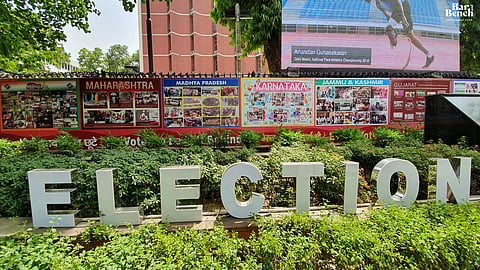
- Latest Legal News
- News
- Dealstreet
- Viewpoint
- Columns
- Interviews
- Law School
- Legal Jobs
- हिंदी
- ಕನ್ನಡ

Non-disclosure of criminal cases of election candidates - either pending or disposed - amounts to undue influence on voters, and such an election can be declared null and void, the Chhattisgarh High Court recently held. [Sapandeep Mahto v. Rajkishan Mahto]
Justice Deepak Kumar Tiwari noted that Rule 25 of the Chhattisgarh Nagar Palika Rules, 1994 clearly mandates disclosure of pending or disposed cases against a candidate in the nomination form.
"Every candidate, who is submitting his nomination for election of Councillor or Chairperson of Nagar Panchayat before the Returning Officer shall necessarily enclose a self declaration form provided in Form-3A and shall necessarily enclose an affidavit, in which, not only the conviction, but also the result of acquittal of every case is necessarily to be disclosed," the bench noted.
The judge further took into account the fact that the petitioner in the present case, Sapandeep Mahto, whose election was rendered void by a lower court, had categorically admitted that he has not furnished such information in the nomination papers. The petitioner had around seven criminal cases registered against between 1998 and 2016.
"So considering the admission of the petitioner himself, the District Judge has passed the order in proper manner, which does not call for any interference. In view of the above, I am of the opinion that this Revision sans merit, the same is liable to be and is hereby dismissed in limine. Non-disclosure of offence while submitting nomination papers has serious consequences," the Bench observed.
Mahto had challenged the orders of a lower court, which had cancelled his election as a councillor to Manendragarh municipality on the ground that he did not disclose the criminal cases filed against him.
He argued that there is no such mandatory provision requiring disclosure of acquittal cases. Non-disclosure of offences as required under Rule 25-A is not substantial in view of disqualification prescribed under Section 35 of the Chhattisgarh Municipality Act, 1961, he argued.
The judge, while referring to the judgment of the Supreme Court in Krishnamoorthy v. Sivakumar and Others, noted that when the candidate has special knowledge of a pending case, cognizance of which has been taken or charges have been framed and there is non-disclosure on his part, it would amount to undue influence and, therefore, the election is to be declared null and void.
Therefore, the Bench, dismissed the revision petition.
Advocate Rohit Sharma appeared for the petitioner, while Advocate Vinod Tekam represented the Returning Officer.